
BASIN RESEARCH
Scope & Guideline
Pioneering Research in Basin Evolution and Architecture
Introduction
Aims and Scopes
- Sedimentary Basin Analysis:
The journal emphasizes comprehensive studies of sedimentary basins, exploring their formation, evolution, and the processes that shape their stratigraphy and sedimentation patterns. - Tectonic and Structural Geology:
Research often investigates the tectonic forces influencing basin development, including faulting, rifting, and other structural controls that affect sediment distribution and basin morphology. - Paleoenvironmental Reconstruction:
Papers frequently focus on reconstructing past environments and sedimentary processes, utilizing various methodologies such as geochronology and geochemical analysis to infer historical geological events. - Source-to-Sink Systems:
There is a consistent focus on understanding sediment transport and deposition from source areas to sinks, integrating sedimentological data with geophysical and geochemical insights. - Geophysical Methods and Modelling:
The journal showcases innovative applications of geophysical techniques and numerical modelling to analyze subsurface structures and sedimentary processes, aiding in the interpretation of geological history.
Trending and Emerging
- Integration of Geochemical and Isotopic Analyses:
There is a growing trend towards utilizing geochemical and isotopic techniques to understand sediment provenance and diagenetic processes, indicating a shift towards more quantitative and detailed analyses. - Impact of Climate Change on Sedimentary Processes:
Recent publications increasingly address the influence of climate change on sedimentation patterns and basin dynamics, reflecting a heightened awareness of environmental factors in geological research. - Use of Advanced Modelling Techniques:
The journal is witnessing a rise in studies employing advanced modelling techniques, including numerical simulations and machine learning, to predict sediment transport and basin evolution. - Multidisciplinary Approaches to Basin Research:
Emerging themes highlight the integration of various geological disciplines, including geophysics, geochemistry, and sedimentology, to provide comprehensive insights into basin systems. - Focus on Carbon Capture and Storage Potential:
With the growing importance of sustainable practices, there is an increasing interest in studies assessing the geological potential for carbon storage, reflecting broader societal and environmental concerns.
Declining or Waning
- Traditional Stratigraphy:
There appears to be a reduced focus on purely traditional stratigraphic studies without integration of modern techniques or interdisciplinary approaches, as the field increasingly emphasizes innovative methodologies. - Static Sedimentology:
Research that solely describes sedimentary features without addressing dynamic processes or their implications for basin evolution has become less prevalent, as the journal moves towards more integrative studies. - Single-Focus Case Studies:
Papers that concentrate on isolated case studies without broader implications or connections to regional or global contexts seem to be diminishing, as the journal encourages more holistic approaches.
Similar Journals

Gondwana Research
Exploring the Depths of Gondwana's Geological LegacyGondwana Research is a premier academic journal published by Elsevier, specializing in the field of geology, with a robust focus on the geological history and processes of the Gondwana supercontinent. With an impressive impact factor and ranking as Q1 in the 2023 Geology category, it stands as a leading platform for disseminating high-quality research. The journal features articles that advance the understanding of Earth and planetary sciences, making significant contributions to geological education and research. Researchers will find its curated content particularly valuable, as it encompasses a wide array of topics including stratigraphy, paleontology, and tectonics, all relevant to both contemporary and historical geological inquiries. Given its substantial reach and esteemed standing—ranked 5th out of 321 in its field—Gondwana Research plays a crucial role in fostering scientific exchange among global experts. Located in the United States with publication continuity from 1997 to 2024, this journal consistently attracts submissions from leading scientists, ensuring that its readership is kept at the forefront of geological discovery and innovation.
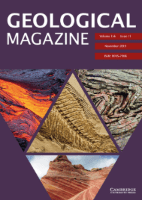
GEOLOGICAL MAGAZINE
Connecting Scholars to the Heart of GeologyGEOLOGICAL MAGAZINE, published by Cambridge University Press, is a premier journal in the field of geology, renowned for its rich legacy since 1864 and ongoing contributions to Earth and Planetary Sciences. With an impressive Q1 ranking in Geology and a Scopus rank of #70 out of 321 journals, it holds a significant position within the academic community, appealing to researchers, professionals, and students alike. The journal covers a wide array of topics, ensuring a comprehensive platform for the dissemination of cutting-edge geological research. Although it does not offer open access, it remains a vital resource for those seeking to stay abreast of advancements in the field. With an enduring commitment to quality, GEOLOGICAL MAGAZINE stands as an essential outlet for scholarly communication and serves as a catalyst for academic discourse within the geological sciences.
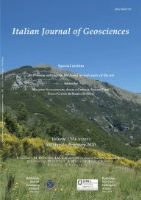
Italian Journal of Geosciences
Unlocking Planetary Insights: Where Earth Meets ResearchItalian Journal of Geosciences, published by the Società Geologica Italiana, is a distinguished platform for the dissemination of research in the fields of Earth and Planetary Sciences and Geology. With an impressive impact factor reflected in its 2023 rankings, where it placed in the Q3 category across its related fields, this journal serves as a vital resource for academics, practitioners, and students. Established in 2010 and poised to continue until 2024, the journal showcases critical advancements and interdisciplinary studies that deepen our understanding of geological processes and Earth systems. Operating under open access options, it offers robust accessibility to a broad audience, facilitating wider dissemination of knowledge. The journal's affiliation with Università degli Studi La Sapienza in Rome, Italy, further underscores its commitment to academic excellence and innovation in geosciences.
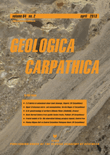
GEOLOGICA CARPATHICA
Exploring the Depths of Earth SciencesGEOLOGICA CARPATHICA, with ISSN 1335-0552 and E-ISSN 1336-8052, is a distinguished open access journal published by the Slovak Academy of Sciences Geological Institute, serving as a pivotal platform for the dissemination of research in the field of Geology. Established in 1991 and continuing through 2024, the journal is recognized for its significant contributions to Earth and Planetary Sciences, evidenced by its 2023 Scopus ranking placing it in the second quartile (Q2) within Geology. With an H-index that showcases its impactful publications, GEOLOGICA CARPATHICA is committed to fostering scholarly communication while promoting accessible research, having adopted an open access model since 2009. Located in beautiful Bratislava, Slovakia, this journal aims to engage a global audience of researchers, professionals, and students interested in ecological, geological, and environmental studies, making it a prominent resource for enriching the scientific community's understanding of the Carpathian region and beyond.

GEOTECTONICS
Connecting Theory and Practice in Geology's Frontiers.GEOTECTONICS is a distinguished academic journal published by PLEIADES PUBLISHING INC, focusing on key developments in the field of geology. Established in 1978, the journal has dedicated itself to exploring the intricate processes and phenomena associated with Earth's tectonic systems, making substantial contributions to Earth and Planetary Sciences. With an impressive impact factor reflected in its Q2 ranking within the Scopus category of Geology, GEOTECTONICS stands out as a valuable resource for researchers, professionals, and students alike. The journal offers a platform for rigorous peer-reviewed research that spans both fundamental theories and practical applications in geosciences, affirming its significance in fostering academic discourse and advancing geological knowledge. Although it currently does not offer open access, the journal's accessible format and continued publication through to 2024 ensures that it remains at the forefront of geoscientific inquiry.
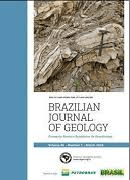
Brazilian Journal of Geology
Navigating the Complexities of Earth ProcessesBrazilian Journal of Geology, the flagship publication of the SOC BRASILEIRA GEOLOGIA, has been a beacon of geoscientific research since its inception in 2013. With an ISSN of 2317-4889 and an E-ISSN of 2317-4692, this open-access journal has facilitated the dissemination of high-quality research across various branches of geosciences, making it freely accessible to a global audience since 2014. Hailing from Brazil, the journal proudly holds a Q2 ranking in Earth and Planetary Sciences as of 2023, and ranks #73 out of 195 in Scopus, indicating its growing impact and relevance in the field. The Brazilian Journal of Geology aims to bridge diverse geological studies with interdisciplinary approaches, promoting the understanding and application of geology in addressing contemporary scientific challenges. As it converges research from 2013 to 2024, the journal not only enriches the academic landscape but also serves as a vital resource for researchers, professionals, and students eager to explore the complexities of the Earth and its processes.
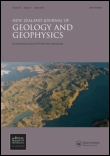
NEW ZEALAND JOURNAL OF GEOLOGY AND GEOPHYSICS
Unveiling the Earth's Secrets Through Rigorous Research.NEW ZEALAND JOURNAL OF GEOLOGY AND GEOPHYSICS, published by Taylor & Francis Ltd, stands as a prominent forum dedicated to the interdisciplinary exploration of geological and geophysical phenomena. With an impact factor that situates this journal in the prestigious Q1 category across key subjects—namely Earth and Planetary Sciences, Geology, and Geophysics—it is a critical resource for researchers, professionals, and students alike. The journal has been operational since 1958 and continues to contribute valuable insights into the complexities of the Earth's processes. Although it does not currently offer Open Access options, its broad readership benefits from an extensive archive of high-quality research findings that span from 1958 to 2024. Located in the United Kingdom, the journal remains a pivotal player in advancing the understanding of Earth's systems, making significant contributions to both academic inquiry and practical applications in the field.
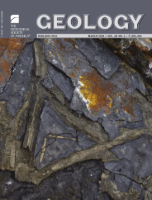
GEOLOGY
Exploring the Depths of Geological KnowledgeGEOLOGY, published by the Geological Society of America, Inc, is a premier journal dedicated to advancing knowledge, research, and discussion in the field of geology. With an ISSN of 0091-7613 and an E-ISSN of 1943-2682, this journal stands out with an impressive Q1 ranking in Geology for 2023, positioning it among the top journals in the realm of Earth and Planetary Sciences, specifically holding a remarkable rank of 11 out of 321, reflecting its 96th percentile status. This journal aims to publish innovative research articles that cover all aspects of geology, from tectonics and sedimentology to paleontology and mineralogy, offering invaluable insights for researchers, professionals, and students alike. Although not currently open access, GEOLOGY maintains a rigorous review process ensuring the quality and integrity of the research it publishes. For more than five decades, spanning from its inception in 1973 to the upcoming publications in 2024, GEOLOGY has been instrumental in shaping the geological discourse and continues to be a vital resource for the scientific community.
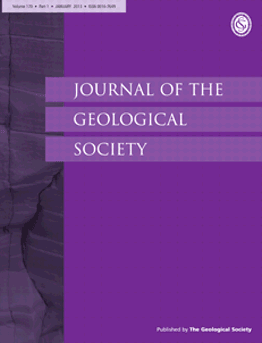
JOURNAL OF THE GEOLOGICAL SOCIETY
Connecting Scholars to the Heart of GeologyJOURNAL OF THE GEOLOGICAL SOCIETY, published by GEOLOGICAL SOC PUBL HOUSE, is a premier academic journal dedicated to advancing the field of geology. With a rich history dating back to 1845 and continuously published until 2024, this journal caters to a diverse audience of researchers, professionals, and students involved in earth sciences. The journal is recognized for its high impact factor, situating it in the top Q1 category in the field of geology, as indicated by its impressive Scopus rank of #49 out of 321, positioning it at the 84th percentile in Earth and Planetary Sciences. This esteemed scholarly platform promotes rigorous peer-reviewed research, ensuring that novel findings contribute to the global geological discourse. Although it operates under a subscription model, the journal's archive offers valuable insights for anyone pursuing excellence in geological research. The JOURNAL OF THE GEOLOGICAL SOCIETY stands as a vital resource for disseminating scientific knowledge and fostering educational growth within the field.

SEDIMENTOLOGY
Advancing the frontiers of sedimentary science.SEDIMENTOLOGY (ISSN: 0037-0746, E-ISSN: 1365-3091) is a premier journal published by Wiley in the United Kingdom, dedicated to advancing the scientific understanding of sedimentary processes, depositional environments, and the broader implications for stratigraphy and geology. With an impressive impact factor that places it in the prestigious Q1 category within both geology and stratigraphy, SEDIMENTOLOGY ranks among the top journals in its field, with Scopus rankings of #3 in Stratigraphy and #20 in Geology, reflecting its significant influence and the high-quality research it publishes. This journal, which conceives high-impact research contributions from 1962 to 2024, serves as an essential resource for researchers, professionals, and students alike, fostering a deeper exploration of sedimentary systems and providing a forum for the dissemination of novel findings. Although not open access, articles published in SEDIMENTOLOGY are critical for enhancing our understanding of sedimentation dynamics, which have far-reaching implications for natural resource management and environmental assessments.